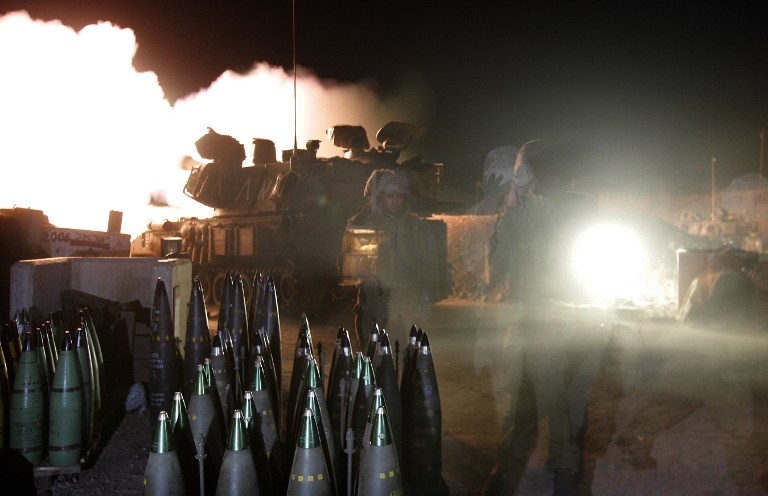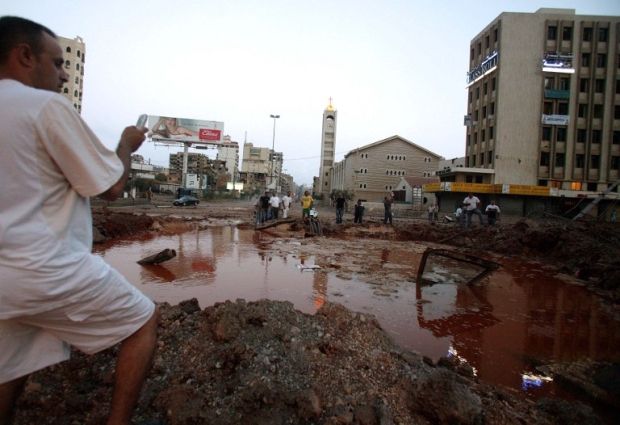Special offer for Lebanon: Time travel with the Israeli military

As Israeli Education Minister Naftali Bennett sees it, another war between Israel and its Lebanese neighbour “will mean sending Lebanon back to the Middle Ages”.
This endearing soundbite was reported on 13 March by Haaretz correspondent Amos Harel following a conversation with Bennett. According to the article, the minister invoked Lebanese President Michel Aoun’s remarks regarding Hezbollah’s integral role in Lebanon’s defence apparatus to justify the medieval approach.
The Middle Ages treatment appears to boil down to a total eradication of any distinction between the Lebanese state and Hezbollah and between military and civilian elements
To be sure, Hezbollah’s defensive functions proved particularly irritating to the Israelis when, in 2000, the organisation spearheaded the eviction of Israel from Lebanese territory after more than two decades of occupation.
The Middle Ages treatment meanwhile appears to boil down to a total eradication of any distinction between the Lebanese state and Hezbollah and between military and civilian elements in the country.
Bennett rues an alleged Israeli promise to the United States government in 2006 “not to hit Lebanon’s infrastructure” during that summer’s 34-day war - a promise the education minister contends thwarted an Israeli victory. He proposes the following formula for future conflicts:
“The Lebanese institutions, its infrastructure, airport, power stations, traffic junctions, Lebanese Army bases – they should all be legitimate targets if a war breaks out.”
Strategic continuity
Beyond the less-than-subtle endorsement of war crimes, there’s another major problem with Bennett’s reasoning - which is that Israel has never been overly preoccupied with civilian-military distinctions in the first place.
For one thing, all of the items on his list of “legitimate targets” were already bombed in 2006. Harel should technically know these things since he himself reported them at the time, but he has nonetheless now determined that “it’s interesting to listen to” Bennett’s opinions on such matters.
As for any impending Israeli massacres of Lebanese civilians, this would constitute more of a continuation of business as usual than novel strategy.
In 2006, most of the estimated 1,200 killed in Lebanon were civilians, including the children slaughtered at close range by Israeli helicopter while attempting to evacuate their villages under explicit Israeli orders.
Also obviously qualifying as civilians were the more than 100 refugees wiped out by Israel in 1996 while sheltering at a United Nations compound in the south Lebanese town of Qana.
Going back a bit further in time, the Israeli invasion of Lebanon in 1978 eliminated thousands of Lebanese and Palestinians, while the subsequent invasion of 1982 did away with some 20,000 people, the vast majority of them civilians.
Were the Israeli leadership at all concerned with cause-and-effect analyses, it might ponder such facts as that the origins of Hezbollah lie in none other than the 1982 affair - and that bombing people into the Middle Ages presumably isn’t the best way to curb anti-Israeli animosity.
Other stops on the tour
As it so happens, the medieval period is not the only forcible time travel option for the Lebanese public; other representatives of the Israeli state have proposed exile to a variety of historical epochs.
The Israeli-induced rubble that often characterises Gaza and Lebanon endows the whole 'stone age' concept with a new connotation
In 2014, for example, the Times of Israel reported that Israeli parliamentarian Yisrael Katz had threatened to return Lebanon to the Stone Age - a destination that is also regularly suggested for the Gaza Strip. Granted, the ubiquitous Israeli-induced rubble that often characterises sections of both territories endows the whole “stone age” concept with a new connotation.
At the start of the 2006 war, meanwhile, Israeli Army Chief of Staff Dan Halutz warned of “turn[ing] back the clock in Lebanon by 20 years” - an arrangement that, if implemented literally, would have conveniently transported the country back to 1986 and the heyday of the Israeli occupation.
In the end, the resetting of the clock entailed the aforementioned mass loss of life and destruction of bridges, thoroughfares, and entire neighbourhoods. When I visited Lebanon shortly after the war, craters had replaced apartment blocks in many areas.
Preemptive exoneration?
According to Bennett, the point of issuing the Middle Ages threat is ultimately to try to avert conflict, a claim that would appear to be rather blatantly contradicted by Israel’s track record.
But a more plausible function of the continued focus on disappearing military-civilian boundaries in Lebanon - rendering everyone and everything in the country fair game for attack - is to preemptively exonerate Israel for war crimes in the inevitable eventual showdown.
Personally, I can’t think of any more suitable CV for an education minister. And with bellicose folks running the Israeli show with the help of a handy system of obligatory army service, the world might do well to contemplate the military-civilian boundaries supposedly in place in the nation currently menacing its neighbours with deportation to past centuries.
- Belen Fernandez is the author of The Imperial Messenger: Thomas Friedman at Work, published by Verso. She is a contributing editor at Jacobin magazine.
The views expressed in this article belong to the author and do not necessarily reflect the editorial policy of Middle East Eye.
Photo: Israeli soldiers stand next to a mobile artillery unit as it fires a155mm shells towards Hezbollah targets based in neighboring southern Lebanon on 12 July 2006, at a military staging area along the northern Israeli border with Lebanon (AFP)
This article is available in French on Middle East Eye French edition.
New MEE newsletter: Jerusalem Dispatch
Sign up to get the latest insights and analysis on Israel-Palestine, alongside Turkey Unpacked and other MEE newsletters
Middle East Eye delivers independent and unrivalled coverage and analysis of the Middle East, North Africa and beyond. To learn more about republishing this content and the associated fees, please fill out this form. More about MEE can be found here.







